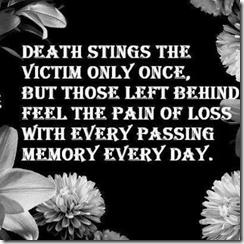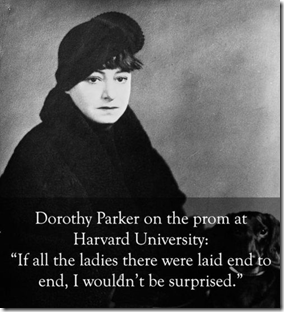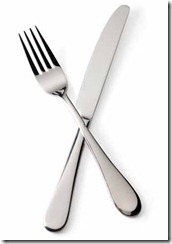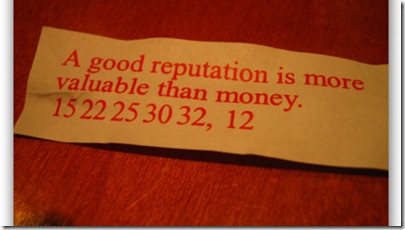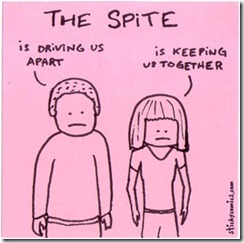Susan Cain is right about most things, but she is wrong about death
/Author Susan Cain posted this in response to her reading from the Book of Ecclesiastes:
I don’t know why everyone talks about the fear of death. I love life, but I don’t fear death. What I fear is the deaths of the people I love best — because I fear the pain of having to live without them. And I fear my own death only insofar as it would cause my loved ones this same terrible pain.
She also posted this image:
Longtime readers of this blog will not be surprised to hear that I do not agree with Susan. It is often said that death is hardest on those left behind, but I disagree. I have always felt that death is hardest on the dead.
Consider my mother.
Mom died in 2007 at the age of 57. Not a day goes by that I don’t think about her and miss her terribly. The loss of a mother represents an inexorable disconnection to your past and a fundamental shift in a your position in the universe that can only be understood by those who have suffered this terrible loss.
It is a tragic thing to lose one’s mother. One of the most tragic things.
Since my mother’s death, I have become the father of two children and a published author. The fact that my mother will never meet my children, nor will she ever read one of my books, breaks my heart again and again. It breaks my heart everyday. Two of the most important aspects of my life will never be known by my mother. It saddens me beyond measure.
But who has it worse? Me or my mother?
It’s not even close. I would argue that my mother has it worse by a hundred fold. A thousand fold. My mother has only been dead for six years, but the number of moments that she has already missed is astounding.
I play with my children every day. I kiss them and hug them and laugh with them constantly. I live alongside a woman who I love and who loves me in return. I reap the daily and oftentimes surprising rewards of a published author. I play golf and poker with my friends and take the stage to tell stories and listen to music and read new books and teach my students about Shakespeare and triangles and eat Egg McMuffins and ice cream.
I am saddened almost daily by the loss of my mother. Her loss stings me again and again and again. There are times when it makes life hard. But my mother will never hear the laugh of a child ever again. She will never read another book or listen to another song or eat another cone of ice cream. She will never know what her children or grandchildren have become, nor will she feel the sweetness of their kisses or the warmth of their embraces. My mother suffers losses on an almost minute-by-minute basis. The world moves on. Wonders never cease. Beauty is created and destroyed. She misses it all. Every second of every day.
The mounting losses that my mother suffers are immeasurable. The idea that she has been stung by death just once is ludicrous. Simply because she is not here to complain about her losses or even experience them firsthand does not make them any less tragic.
I wish the idea that death is hardest on the living would go away. I find this sentiment shortsighted at best. It represents the idea that the continued unraveling of time is irrelevant and meaningless to anyone no longer here. It allows the living to focus solely on the here and the now and leave those who have died firmly in the past. It permits the grieving to encapsulate and codify a life in its moment of existence and never imagine what could or should have been. It affords us the opportunity to erase all lost and possible futures for our deceased loved ones. It’s a focus on the self and the present that I find narcissistic and a little cruel.
Yes, the loss of a loved one is hard. It is incredibly hard. But the absence of a loved one and the cessation of their existence does not mean that their losses are any less terrible.
Death is hardest on the dead, because the living move on. The grieving have friend and family, books and music, ice cream and Egg McMuffins to comfort them. They remain a part of the story. They get to see what comes next. Opportunity and hope remain integral parts of their lives.
I miss my mother every day. Her loss makes life harder. More bitter. Less joyous. But she has it far worse. Do not pity the living, because we still possess life, the most precious of all commodities.
Pity the dead for all that they have have lost and will continue to lose forever more.
Comebacks for sale. Cheap. Highly effective. Brutal if desired.
/I’ve recently expressed admiration for Pope Francis and his comments on homosexuality and his willingness to be accessible to the people. Unfortunately, I’m not as excited about the pope’s recent decision to offer indulgences for following him on Twitter:
According to the Vatican's Sacred Apostolic Penitentiary publication, Pope Francis will be giving "plenary indulgences" — which is a special act that is said to reduce time in purgatory — to his Twitter followers. The Pope typically offers indulgences to those who see him in person, but for the first time this year, it will extend to virtual visits, too.
For social followers who have previously confessed their sins, have been absolved by a priest and have attended mass, they can follow along live through the social networking site and receive that special forgiveness.
The whole idea of purgatory is fairly insane, but the idea that Catholics can spend less time in this invented realm by clicking the Follow button on Twitter is ridiculous.
I understand that the pope wants to use social media to better communicate to his people, but purchasing their attention through the distribution of indulgences is not far removed from a time when the Catholic Church sold indulgences for money.
However, that will not stop me from making an even better offer:
If you agree to follow me on Twitter, I promise to offer you my expertise in the realm of verbal sparring.
Without trying to sound self-congratulatory, I am a master of the verbal comeback. The king of quips. An expert in the art of the rapid retort.
It might be my greatest talent.
If someone says something mean, insulting, scathing or passive-aggressively cruel to you, send me the remark via Twitter and I will send you the ideal comeback.
Also, feel free to also send me the intensity level that you would like the comeback to achieve, and I will try my best to tailor the retort to meet your specific need.
Perhaps you want a comeback suitable for use in a public setting. Maybe you’d prefer a no-holds-barred, sword-to-the-gut comeback (my favorite). Or perhaps the circumstances require a more passive-aggressive approach.
You can even send me anticipated cruelties in order to be better prepared for your next encounter. Does your mother-in-law constantly complain about the way you’re raising your children? Does a coworker disapprove if your lifestyle choices? Is your spouse critical of your eating habits?
Send me their constant refrains and be armed with an appropriate comeback for the next encounter.
Whatever your need, I will have it, and all for the price of a Twitter follow.
Which would you prefer:
A shortened stay in a non-existent spiritual realm or access to a master in the art of verbal sparring?
To hell with the hedgehog.
/One of my closest friends argues that I have a tendency to spread myself too thin. He thinks that I would realize greater success in my professional life if I focused on only one thing instead of attempting to do so many different things at the same time.
Some would call this a hedgehog and fox debate, an idea first introduced by the ancient Greek poet Archilochus, who said that the fox knows many things about a little, but the hedgehog knows one big thing.
A different friend sent me this quote, which aptly summarizes my position on the fox and hedgehog debate:
"A human being should be able to change a diaper, plan an invasion, butcher a hog, conn a ship, design a building, write a sonnet, balance accounts, build a wall, set a bone, comfort the dying, take orders, give orders, cooperate, act alone, solve equations, analyze a new problem, pitch manure, program a computer, cook a tasty meal, fight efficiently, die gallantly. Specialization is for insects." – science fiction writer Robert Heinlein
Yeah. That.
Oh, and in terms of Heinlein’s list, I can:
- change a diaper (unfortunately)
- plan an invasion (thanks to videogames and capture-the-flag)
- conn a ship (sailboat, canoe and rowboat)
- write a sonnet (none of them are very good, but still)
- balance accounts
- build a wall (stone)
- comfort the dying (as long as it isn’t me)
- take and give orders (I’m better at both than you might expect)
- cooperate, and act alone (though I prefer to act alone most of the time)
- solve equations (thanks to college algebra)
- analyze a problem (though it’s often greeted with great disdain)
- pitch manure (spent my childhood doing this)
- program a computer
- cook a tasty meal (breakfast)
- fight efficiently (never lost a fight)
I still can’t butcher a hog (nor do I want to), design a building (shouldn’t we leave this to experts?) or set a bone (though I’ve temporarily splinted more than one).
I’ve died twice already, but I don’t think I’ve done it gallantly either time.
You might want to throw away your bathrobe. Here's why.
/I threw away my bathrobe today. I never wore it.
I never found a single moment to wear it in the five years I owned it.
This is not to criticize anyone who wears a robe after they emerge from the shower, but it takes me about 30 seconds to dry off using a towel and about 30 seconds to get dressed.
Every time I reached for my robe, I thought, "Get dressed and get on with your day, damn it."
If you’re wondering where you might recapture a few extra minutes every day (which add up quickly), consider tossing the robe. It may be sucking the life out of you.
And one less thing is always a good thing.
Anatomy of agreement
/First I see Slate’s tweet:
The American way of using a fork and knife is inefficient and inelegant. Here's a better way: http://slate.me/11MPniB
I’m annoyed. The piece already sounds trite and presumptuous. It deals with something as snobbish and unimportant as table manners. I assume it’s written by a Frenchman.
Then I click the link. I read the title:
Put a Fork in It: The American way of using fork and knife is inefficient and inelegant. We need a new way.
Still annoyed. Seems like a waste of a perfectly good hyperlink.
I look for the author’s name:
Mark Vanhoenacker
Okay, probably not French. Maybe Finnish. Still annoying.
Grudgingly, I begin to read.
Vanhoenacker points out that when using both a fork and knife, Europeans (and everyone else, basically) will keep the fork in their left hand and the knife in the right as they cut and eat their food. But when an American cuts his food, he’ll lower his knife to his plate and then he’ll switch the fork to his right hand to convey the food.
This, Vanhoenacker argues, is both inefficient and a relic of a time when Americans were trying to be more like Europeans (this maneuver was once considered proper table manners in European countries, but no longer).
Inefficient? How much time could we actually be wasting by switching a fork and knife? Is dinner really going to end sooner if we stop?
And I’m glad that what we do is unlike the Europeans. Good. We’re Americans, damn it. We can use our fork and knife any way we please!
Then something happened.
It occurred to me that as a left-hander, I don’t cut and switch. I hold my fork with my left hand and cut with my right.
I don’t switch.
“Wait a minute,” I thought. “Maybe this Vanhoenacker guy is onto something. Imagine how many times the average American cuts and switches over the course of a lifetime. That can really start to add up. And I’m all about efficiency. I strive for efficiency in every part of my life. Why not at the dinner table as well?”
Then I thought about it a little more.
“And you know what? I don’t want my eating habits to be dictated by some centuries old attempt to be more like stodgy old Europe. We’re Americans, damn it. We do things they way we want. Not the way some aristocrat dictates.
This Mark Vanhoenacker is a genius
See how easy it is to get me to agree with you?
Piece of cake.
Where do you get your ideas?
/I am often asked where I get the inspiration and ideas for my stories, especially considering that I’m fortunate enough to have so many ideas from which to choose.
A few years ago I wrote a post explaining my process. Since I continue to be asked this question almost more than any other, I thought I’d update that post here. I’ve completed two more books and a short story since then, so I have more to share on the subject.
It’s rally the kind of question that is impossible to answer with a single sentence, because I never know when I might stumble upon an idea that could make a great book. I tend to be the kind of person who asks a lot of “What if?” questions, and through these questions, many of my ideas are born.
But since that is a relatively meaningless answer, I thought I’d give you some specific examples of how some of my stories were born.
SOMETHING MISSING: Over dinner several years ago, a friend bemoaned the loss of one of her earrings. She opened her jewelry box and could only find one of the two earrings that made up the pair.
In an attempt to make her smile, I asked, “What if someone broke into your house and stole your earring but left the other one behind so you wouldn’t suspect theft?” As I gnawed on a dinner roll, I found myself trying to imagine the kind of person who would break into every home in America and steal just one earring from every woman’s jewelry box.
Although I didn’t know it at the time, that was the moment that Martin Railsback and his story were born.
UNEXPECTEDLY, MILO: For a long time, I wanted to be a film director. At one point I had the idea for a movie in which three less-than-savory characters steal a video camera from a family on vacation in New York City. After watching the videotapes in the privacy of their cockroach-infested apartment, the trio realizes that the memories captured on the videotape mean more to the family than they could have ever imagined, and they decide to return the tapes to their owners. They watch the footage in order to glean clues as to the owner’s identity, and in doing so, they become uncommonly attached to the family as a result. This idea served as the basis for UNEXPECTEDLY, MILO.
However, I also dipped into my own life for major pieces of the plot, including:
The separation and divorce from my first wife in 2003.
The two months spent in fourth grade helping a friend plan his escape to an uncle’s house in the Midwest. Chris wanted to run away from home, something he had done before, and though he never made the journey that we planned in the back of the classroom, I often wondered what might’ve happened if Chris had run away from home and had disappeared in the process. How would I have felt knowing that I had a hand in my friend’s disappearance, and how might that have impacted the rest of my life?
This became a major plot point in the story.
CHICKEN SHACK (an unpublished manuscript): There was once a potato chip factory in my hometown of Blackstone, Massachusetts that produced a brand of potato chips called Blackstone Potato Chips. The factory closed years ago, and on a trip back to Blackstone, I noted that the factory was now a funeral home. “Wouldn’t it be great if they still sold potato chips and embalmed dead people at the same time?” I said to my wife as we drove by. A moment later, the idea of a funeral home that also sells fried chicken landed in my mind and CHICKEN SHACK was born.
Once again, I dipped into my own personal life for other key elements to the story, including:
The disappearance of my brother, Jeremy, who I had not seen for more than five years after my mother died.
A public, and in the words of many attorneys and law enforcement officers, unprecedented attack on my character and reputation by an anonymous source several years ago.
My occasional forays into amusing and ultimately meaningless forms of vigilante justice, mostly as a teenager but occasionally as an adult.
MEMOIRS OF AN IMAGINARY FRIEND: This book began with a simple conversation with my student-teacher about an imaginary friend that I had as a child. In the span of about four sentences, the idea for Budo and his story was born.
I also managed to take advantage of my experience with autistic children when writing my book, and on an unconscious level, my constant, persistent existential crisis became a key element in the story as well.
THE PERFECT COMEBACK OF CAROLINE JACOBS: My next book began with a conversation that my wife and I had in bed one night. We were talking about her childhood home, and she told me about something cruel that a friend had said to her during a sleepover.
“Wouldn’t it be great if you could find that girl today and finally tell her off?” I asked.
Just like that, the book was born.
My next book is the story of a woman who suffered at the hands of a bully in high school, and much later in life, decides to finally do something about it. I used some of the bullying and hazing that I experienced in high school as inspiration, but most of the story was born from that simple question asked to my wife while lying in bed one night.
BETTY BOOP: The idea for this manuscript, which I am still tinkering with on the side, was born after reading about a 2009 law outlawing prostitution in the state of Rhode Island. Prostitution was actually legal in Rhode Island between 1980 and 2009 because there was no specific statute to define the act and outlaw it, although associated activities, such as street solicitation, running a brothel, and pimping, were still illegal. With the passing of the 2009 law banning prostitution, I found myself wondering what a prostitute in Rhode Island might do now that his or her previously legal means of earning a living were suddenly forbidden. I came up with an solution for my theoretical prostitute, and that is the basis for this book.
Farewell to Arms: I recently wrote a short story that is currently under submission to several literary journals. It is an uncharacteristically dark story of an armless soccer team.
It was written on a dare.
Someone at work commented that soccer is so popular around the world because you don't need anything to play. Even a crumbled-up bit of newspaper can serve as a ball.
"You don't even need arms," I said. "That would be a story. Huh? A soccer team with no arms."
"Even you couldn't write that story," my friend said.
I took up the challenge and wrote the story in three days.
The friends who have read the story like it a lot. I’m waiting to see if the literary magazines agree.
How To Be A Grownup In 10 Steps (revised)
/Kelly Williams Brown’s book Adulting: How to Become a Grown-Up in 468 Easy(ish) Steps is reportedly “the most helpful guide to becoming a successful adult you’ll ever find.”
Publisher’s Weekly recently offered ten steps from her book to get you started.
I decided to create my own list, and after some reader feedback, I have revised my original list, eliminating items, revising others and adding new items.
I received many suggestions for additions and changes to this list, and my apologies if your suggestion didn’t make the cut. If I was writing a book with 468 steps, all of your suggestions would be on my list. Instead, I chose to keep my list to an even ten.
How To Be A Grownup in 10 Steps According to Matthew Dicks
1. Never speak poorly of a person’s physical appearance. This includes references to a person’s weight and choice of clothing.
2. Make every effort to arrive on time for all things.
3. Drive safely at all times. Many lives depend upon it.
4. Never judge a person based upon the quality (or absence) of their gift.
5. Spend more time reading than watching television.
6. Let go of the expectation that life should be fair and equitable.
7. Seek to identify and acknowledge your weaknesses and faults.
8. Regardless of your circumstances, be an outstanding role model whenever you are in the presence of children.
9. Doubt all things. Avoid blind acceptance at all costs.
10. Remember that there not everyone’s brain is like yours. Others may be geniuses, impaired, chemically unstable or damaged. Assume nothing and be gentle with your words and actions.
Summer Writing Academy: Anyone want in?
/Here is the plan.
Find ten students, ages 11-18, who want to be writers and want to be treated like real, professional writers.
As all students should.
Some might want to begin their first novel. A few may have a college essay in need of completion. Perhaps there is a poet or two in the mix. A future journalist. Maybe even a screenwriter.
Assemble these students for a summer writing academy. Teach them to write by treating them like real writers. Allow them to write whatever they want and need to write with the understanding that every word committed to paper could earn them a living someday.
Professional writers find audiences. Professional writers get paid. This is what I want for all my students, including the ones I hope to teach in summer academy.
Teach them the craft. The art. The nuts and bolts. The business of writing. Teach them how to write. Teach them to find something to write about. Teach them how find an audience, query an agent and sell their material.
Invite real life authors to speak to them. Novelists. Journalists. Poets. Screenwriters. Invite literary agents to chat. Maybe even an editor or two.
Writing instruction from actual writers.
Teach these kids to write like professionals and demand that they be treated like professionals. Send them forth with the skills, the passion and the understand about what it takes to be a writer.
This is my plan.
I need ten students.
I won’t be teaching the academy for free. I could be working on any one of my three current manuscripts, but I find myself excited about this idea. I’m willing to place my own writing on the back burner for a month to see what these students can become.
But it will be worth every penny.
Here are the details:
Four weeks of instruction in July.
July 8 through August 2.
Monday, Wednesday and Friday from 9:00 AM until 1:00 PM.
48 total hours of instruction plus non-contact hours spent reviewing the students work and two hours of one-on-one meetings before and after the academy with parents and students.
The first meeting, which will take place during the first week of the academy, establishes goals for the student.
The second meeting, at the conclusion of the academy, reviews in detail the strengths and weaknesses of each student. We prepare a plan for the student’s writing future. What should the student continue to work on? How should this happen? What should it look like?
After four weeks, my hope is that each student will have taken an important step in the life of a professional writer. A path will be designed for the future. The student will have the beginnings of a novel, the start of a poetry collection, a college essay or a piece to submit to newspapers and magazines.
Maybe all three.
This is my plan.
I need ten students to make this work.
Classes will be held in a library in West Hartford, CT.
Anyone interested? Anyone know anyone who might be interested?
Please pass on the word.
The secret of the first follower
/This is brilliant. Absolutely brilliant.
It’s also what I often lack when I propose a new idea. Perhaps I have less charisma than the half naked dancing man in the video.
The secret to my success
/Befriend as many great and talented people who are also willing to tolerate me and my friendship as possible.
Then stand close to them.
Mention their names in conversation often.
Make my connection to them as obvious to as many people as possible.
Enjoy the resulting increase in reputation and image.
My wife is the embodiment of this strategy. I am convinced that people who would not and should not like me are forced to reconsider upon learning who I married, and more importantly, who was willing to marry me.
How To Be A Grownup in 10 Steps
/Kelly Williams Brown's book Adulting: How to Become a Grown-Up in 468 Easy(ish) Steps is reportedly “the most helpful guide to becoming a successful adult you'll ever find.”
Publisher’s Weekly recently offered ten steps from her book to get you started.
I decided to create my own list. If you have a suggestion to add my list, I would love to hear it.
How To Be A Grownup in 10 Steps According to Matthew Dicks
1. Never speak poorly of a person’s physical appearance. This includes references to a person’s weight and choice of clothing.
2. Make every effort to arrive on time for all things.
3. Drive safely at all times. Many lives depend upon it.
4. Never judge a person based upon the quality (or absence) of their gift.
5. Spend more time reading than watching television.
6. Get an annual physical and flu shot.
7. Let go of the expectation that life should be fair and equitable.
8. Freely acknowledge your weaknesses and faults.
9. Exercise with regularity.
10. Regardless of your circumstances, be an outstanding role model whenever you are in the presence of children.
I’m not spiteful. I’m “aggressively moralistic.”
/For a long time, I have claimed that spite is one of the best reasons to do anything.
I’ve cited examples in which authors and scientists have used spite to motivate them to great achievements.
I’ve written about how spite is one of my 5 primary motivating factors in life.
I’ve argued that spite is one of three possible steps to happiness in your professional life.
I’ve even written about how a positive attitude can be utilized in the pursuit of spite.
Then I listened to the most recent episode of the Freakonomics podcast, which addressed the economics of spite, and it turns out that I am not spiteful after all.
Spite, by definition, requires a person to actively harm him or herself in the pursuit of harming another.
When I told a friend about this definition, he said, “Oh no. You’d never harm yourself for anyone. You’re far too selfish for that.”
He’s right.
Instead, it turns out that I am aggressively moralistic, a state in which I am willing to bring harm to those I feel are deserving while receiving no discernible or tangible benefit in the process.
From an economist’s view, aggressively moralistic is a more sensible position than spite simply because it does not come with any cost except for time and effort.
It is still an economically unwise decision according to economists, because effort and time spent absent of reward is not economically sound, but not nearly as foolish or personally damaging as spite.
I would argue, however, that economists are disregarding the value of personal satisfaction and the potential joy associated with metering out justice, delivering a deserving bit of comeuppance or being able to say the four best words in the English language:
These may not be the rewards that economists value, but for me, there are few things that I enjoy more.
Deep thoughts on God, pets, holidays and the Internet: Ian Martin covers it all
/British author Ian Martin offered 60 thoughts on turning 60 years-old.
The whole piece is excellent. Here are a few items that I especially loved:
__________________________________
20. A pre-internet world is unthinkable.
21. There wasn't any internet 30 years ago.
It’s true. And though the Internet is 30 years old, it is less than 20 years old for most of us. I was active on the Internet in 1995, but most of my classmates at Trinity College were not. Even then, the Internet was a shadow of what it is today. There was no commerce and little two-way communication between users. In terms of ubiquitous use by a large segment of the American public, the Internet didn’t truly take hold until the beginning of this century. Despite all this, it’s almost impossible for me to imagine a world pre-Internet today.
Also, please note that Martin doesn’t capitalize the word “internet.” I’m not sure if this is a British convention, but it’s the way Internet should be spelled.
__________________________________
24. Holidays seem so much more arseache than they are worth.
I love this for two reasons.
First, the word “arseache” is brilliant. I don’t know if it’s a word that the Brits use on a regular basis, but I love it. So much better than the phrase “pain in the ass.”
Also, I agree with him. Holidays of every kind are almost always a pain in the ass.
__________________________________
41. Oh shut up, of course God exists. Even if God turns out to be just science in fancy pajamas. Honestly, you think all this stuff "militant here in Earth" is not being saved to some "memory cloud"? There are Tumblr accounts for people's bloody cats.
God is “just science in fancy pajamas.” That’s a religious view I can almost get behind.
__________________________________
My wife would most heartily approve the following:
11. I have nothing against pets in theory. It's just that, in reality, pets are noisy, selfish, practically incontinent, morally depraved and just really stupid. They are walking, flapping analogs of your own paranoid self-loathing. You take your soul-searching Labrador for a walk and a chat. I'll just watch a bit of telly.
I am reminded at least once a week that we will not be getting any more pets ever again.
Parenting perfection
/This really is perfect.
The strategy. The tone. The ability to utilize the strategy on an almost daily basis.
I love t.
I’m not sure if it will still apply by the time my children are in need of this kind of coercion (we may have the Internet implanted in our brains by then), but it is an excellent reminder of how easy it can be to manipulate human behavior.
Girl on the edge
/My daughter teaches me something new every day.
Today she reminded me that if given the opportunity to walk on the sidewalk or the more precarious curbing, the curbing is always much more fun.
We sometimes forget these little things as adults. We must remember to look to our children for these reminders lest become old, crotchety, staid, or worst of all, boring.
Dead boys sitting beside a pond
/This is a 1929 postcard of the original Protestant Cathedral at Yawgoog Scout Reservation on Wincheck Pond's Thrush Cove, courtesy of The Story of the Yawgoog Trails.
I love this photo. The site of the Protestant Cathedral at Yawgoog is one of my favorite places on the planet.
But my heart also aches while looking at this image. I always feel this way looking at photos like this. Almost any old photo, really.
Look at these boys. They have so much of life still ahead of them. So much to look forward to. So much potential. They are young and strong and have no idea what challenges and blessing are in store for them. It’s a moment of their lives captured forever by a unknown photographer, but other than this image, this moment and their lives are tragically fleeting.
Even with so much ahead of them, their time on this Earth is spinning out faster than their young minds could ever imagine.
This photograph is 84 years old. Most, if not all of these young boys, are dead now. Their lives are over. All of that potential and possibility has reached its conclusion. This day spent on the shores of Wincheck Pond is not even history. Other than this single photo, there is no record or remembrance of that day.
In another 84 years, no one alive will even remember that these boys ever existed. A great-grandchild might remember a first name or possess some apocryphal story about a moment of courage in a war fought before their parents were even born, but that will be it. Despite the primacy and importance of their lives in their time, nothing will remain of these boys by the shores of that small pond.
I find myself wanting to reach into the photograph, reach back through time, and warn these boys of how insubstantial life is and how soon they will all be dust. I want to tell them to breathe in the air, squint into the sunshine, dip their toes into the pond water and mark this moment in some way that will make it last forever. For them and for us who will follow.
Except for most people and almost every moment in time, forever is impossible. We have this photograph, this miracle of light and film that has captured an image of a moment beside a pond, but nothing more. History has been lost to the ether, never to be recovered.
My heart aches for these boys. It aches for all of us.
It’s not actually “trouble” if all your boss did was yell at you.
/Trouble is a matter of perspective.
When a fellow teacher tells me that he or she “got in a lot of trouble” for failing to complete a task or adhere to a policy, this most often means that the principal has spoke to the colleague and warned him or her against committing the offense again.
I do not think of this as trouble. I think of this as being spoken to by your boss.
Early in my career, when I was less subtle and considerably less intelligent, I would point this out to my colleagues, failing to realize that many of them graduated from high school and college with 4.0 GPAs, spotless disciplinary records and lists of extra-curriculum activities a mile long.
In this regard, I guess that being called into the principal’s office for a verbal reprimand could be considered trouble.
They’ve never been suspended from school as a student. Caught selling term papers to fellow classmates. Received in-school suspension for damaging school property. They never received a report card with an F or even a D. They’ve never been arrested by the police. Had the police break up a party in their apartment. Been tried in a court of law. Faced a prison sentence. They’ve never been fired from a job or had their career threatened in any meaningful way.
Trouble is a matter of perspective. When you come from a background like mine (as described above), a verbal reprimand does not constitute trouble. It’s merely a verbal reprimand. A reminder about what you’re supposed to be doing. Or what you’re not supposed to be doing.
For some (and to their credit), a verbal reprimand is the most trouble that they have ever experienced.
That said, even with a pristine record, I still have a hard time accepting the idea that your boss’s expression of disapproval constitutes trouble.
A solution to the balancing of home and work
/I’d like to propose a solution to the seemingly omnipresent struggle between the work and home life balance:
Spend less time worrying, complaining, commiserating, measuring and strategizing about your work and home life balance and spend more time actually living your life.

